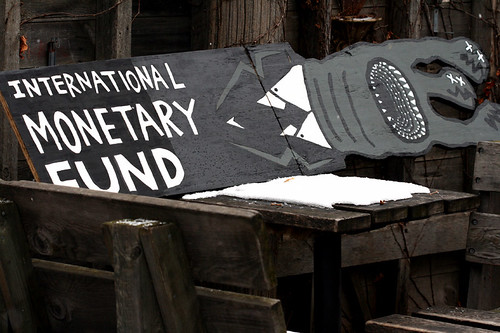IMF funding faces the Capitol Hill merry-go-round
In the world of Bretton Woods watchers such as myself (and what a world that is), all eyes are on the US Congress, where lawmakers are deciding on the fate of President Obama’s commitment at the G20 to boost the US’s contribution to the IMF by $108 billion. There is no doubt that the Fund needs that money (as part of an overall increase of its resources to £750 billion) but things are not going smoothly on the Hill.
Unfortunately, US politics being what it is, the increased funding is part of another bill… an Iraq war financing bill. Of course, this means that Congressmen and women can’t vote for IMF funds without also voting for war funds and can’t vote against war funds without also voting against IMF funds. (And vice versa.) According to Mark Weisbrot:
from the beginning, the administration has faced tremendous obstacles to getting a majority members of the House of Representatives to vote for the money in an up-or-down vote. This is because many members of both parties are afraid that it would be seen as another taxpayer bailout for the financial industry – and foreign banks at that.
So we are left with a state of affairs in which some Democrats are rebelling against the Bill for war reasons, and others because they want moves on IMF reform (particularly in terms of its dangerously austere lending conditions) in exchange for the increasing funding proposed. Few would argue that this is a sensible and eminently just request. However, the US Treasury (which of course has an enormous degree of sway over IMF policy) has refused to commit to this as a condition of the increased funds. Republicans, meanwhile, ostensibly just want the IMF money put to a separate vote. But (Weisbrot again):
Interestingly, the Republicans are not trying very hard to get the IMF money removed. They are not saying anything on television or in the media. This indicates that they may want this money to pass with only Democratic votes, so that they can attack the Dems – especially those in conservative districts – when the money ends up bailing out the European banks in eastern Europe.
Of course, that’s a solid criticism and no doubt it’d play very well. But at the end of the day, this is exactly what the IMF is meant to do, it’s part of what it was set up for and it’s certainly part of the job of a hegemonic country that claims to be ‘ready to lead once more‘.


